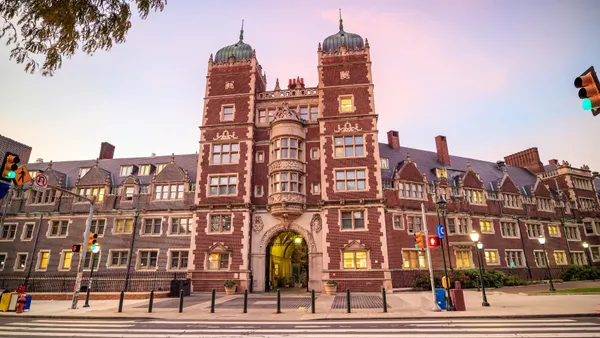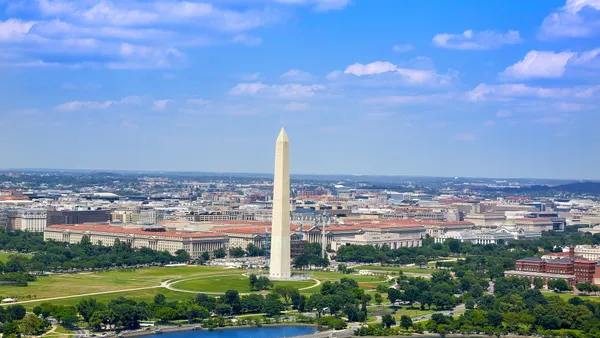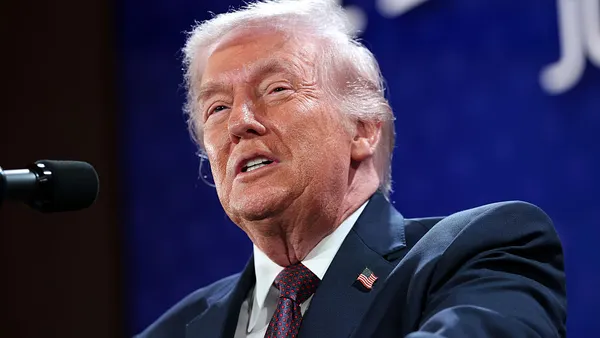Dive Brief:
- In the first half of the year, 16 states enacted 22 bills designed to censor higher education, according to an analysis released Thursday by PEN America, a free expression group.
- According to PEN America’s count, 21 states have enacted bills that censor higher education since 2021, with nearly 40% of the U.S. population now living in a state with such a policy.
- The researchers noted that while headlines have often focused on threats to higher ed from the federal government, including research funding cuts, the news out of state legislatures has been "just as devastating.”
Dive Insight:
Legislation to censor higher ed takes different forms, according to PEN America’s analysis.
The measures include what researchers call “educational gag orders,” meaning laws designed to dictate “what can and cannot be taught in the college or university classroom,” according to the analysis. Lawmakers have also pursued legislation to restrict diversity, equity and inclusion offices and undermine academic freedom indirectly, such as by weakening tenure protections, PEN America said.
These types of censorship often overlap, the researchers suggested. Four state bills were enacted so far in 2025 both restrict DEI and classroom speech, according to the analysis.
They include a new law enacted in Mississippi in April. Among other provisions, the legislation broadly bars DEI initiatives in public colleges and schools.
It also specifically prohibits public colleges and K-12 schools from engaging in or requiring diversity training. The law defines that as any training — formal or informal — designed to raise “awareness or understanding of issues related to race, sex, color, ethnicity, gender identity, sexual orientation, religion or national origin.”
Yet, the researchers wrote, this provision did not exempt academic instruction, “the very purpose of which is to increase awareness and understanding.”
The provision, however, is on hold for now. A federal judge recently paused it and other major parts of the law, ruling that accounts from educators in a lawsuit against the legislation suggest “possible widespread suppression of speech.”
Meanwhile, 21 of the state bills enacted in the first half of 2025 attempt to indirectly censor higher education, according to the analysis. These include bills that undermine accreditors, hamper college leaders from speaking out and weaken faculty power over institutional policies, the researchers said.
West Virginia and Wyoming have each recently enacted legislation that bars public colleges from requiring either instruction or classes for students that cover certain topics or concepts touching on race, gender and sexuality.
“These laws essentially suppress courses or even entire disciplines, and extend the reach of legislators into controlling academic teaching in new ways,” the researchers said.
And some states impose mandated courses and content. Ohio, for instance, enacted a sweeping higher education law that requires students to take a civics course with specific readings required by the legislation.
The course may be useful for college students, the PEN America researchers wrote. But, they continued, “When legislators prescribe course content with this level of detail, it amounts to censorship; they effectively wrest decisions over what skills, materials, and knowledge will best prepare students for career success away from faculty.”
The researchers also called out a recent law enacted in Texas that gives public colleges’ governing boards the sole power to create faculty senates.
The senates will be limited to 60 members, and the college’s president will be in charge of selecting the body's top officials. The faculty senates also will only serve in an “advisory” capacity, according to the legislation.
“This new power structure makes clear that in Texas, public institutions of higher education are not accountable to their academic experts, their students, or even their institutional missions — but to state legislators and their appointees,” PEN America researchers said.
They argued that state bills enacted in recent years amount to “a radical shift in the relationship between state governments and higher education” where classroom censorship is becoming normalized.
“In this precipitous climate, guarantees of the academic freedom that underpins scientific discoveries, groundbreaking thought, and the right to hold truth to power are becoming increasingly tenuous and uncertain,” they wrote.














